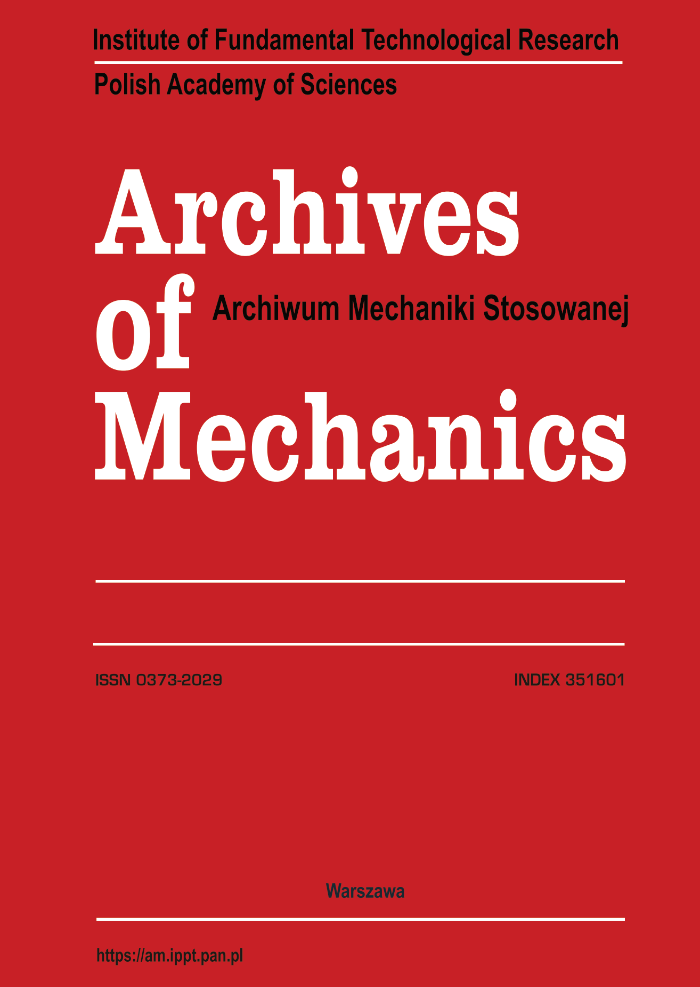Influence of rotation and couple stresses on convective stability in Navier–Stokes–Voigt fluid
Abstract
This study investigates the influence of rotation and couple stresses on the convective stability of the Navier–Stokes–Voigt fluid under various boundary conditions, employing both nonlinear (via the energy method) and linear (using the normal mode analysis method) approaches. The eigenvalue problem is derived for both analyses and solved using the Galerkin method to obtain the Rayleigh number. It has been observed that the critical Rayleigh number is identical for both analyses, confirming global stability and the absence of subcritical instabilities. Notably, we find that increasing the couple stress parameter significantly narrows the spectrum of wave numbers for oscillatory modes. Conversely, higher Taylor numbers and Kelvin–Voigt parameters expand the wave number spectrum for oscillatory convection. While couple stresses and rotational effects provide stabilizing influences, the Kelvin–Voigt parameter acts as a destabilizing factor for oscillatory convection. These findings offer valuable insights with potential applications in improving fluid stability and thermal management across a wide array of industries, including industrial cooling systems, aerospace engineering, biomedical devices, energy systems, and environmental engineering.Keywords:
nonlinear and linear analyses, couple stresses, rotation, Navier–Stokes–Voigt fluidReferences
- Chandrasekhar, Hydrodynamic and Hydromagnetic Stability, Dover, New York, 1981.
- D.D. Joseph, Fluid Dynamics of Viscoelastic Liquids, Springer Science & Business Media, New York, 2013.
- B. Straughan, Continuous dependence and convergence for a Kelvin–Voigt fluid of order one, Annali dell’Universita di Ferrara, 68, 49–61, 2022.
- A.P. Oskolkov, Initial-boundary value problems for equations of motion of Kelvin–Voight fluids and Oldroyd fluids, Trudy Matematicheskogo Instituta imeni V.A. Steklova, 179, 126–164, 1988.
- V. Zvyagin, M. Turbin, The study of initial-boundary value problems for mathematical models of the motion of Kelvin–Voigt fluids, Journal of Mathematical Sciences, 168, 157–308, 2010.
- B. Straughan, Instability thresholds for thermal convection in a Kelvin–Voigt fluid of variable order, Rendiconti del Circolo Matematico di Palermo Series 2, 71, 187–206, 2022.
- B. Straughan, Thermosolutal convection with a Navier–Stokes–Voigt fluid, Applied Mathematics and Optimization, 84, 2587–2599, 2021.
- B. Straughan, Nonlinear stability for convection with temperature dependent viscosity in a Navier–Stokes–Voigt fluid, The European Physical Journal Plus, 138, 438, 2023.
- A.J. Badday, A.J. Harfash, The effects of the Soret and slip boundary conditions on thermosolutal convection with a Navier–Stokes–Voigt fluid, Physics of Fluids, 35, 014101, 2023.
- M. Basavarajappa, D. Bhatta, Nonlinear stability analysis of Rayleigh–Bénard problem for a Navier–Stokes–Voigt fluid, International Journal of Non-Linear Mechanics, 162, 104712, 2024.
- G.N. Kavitha, B.M. Shankar, I.S. Shivakumara, On the magnetohydrodynamic stability of channel flow of Navier–Stokes–Voigt fluid, Physics of Fluids, 36, 043105, 2024.
- Z.A. Afluk, A.J. Harfash, Instability of thermosolutal convection in a Brinkman–Darcy–Kelvin–Voigt fluid, Journal of Porous Media, 28, 1–19, 2025.
- S. Sharma, Sunil, P. Sharma, Stability analysis of thermosolutal convection in a rotating Navier–Stokes–Voigt fluid, Zeitschrift für Naturforschung A, 79, 689–702, 2024.
- V.K. Stokes, Couple stresses in fluids, Physics of Fluids, 9, 1709–1715, 1966.
- H.C. Weng, Couple-stress effect on the effective viscosity of magnetic fluids, Physics Procedia, 9, 63–67, 2010.
- Sunil, R. Devi, A. Mahajan, Global stability for thermal convection in a couple-stress fluid, International Communications in Heat and Mass Transfer, 38, 938–942, 2011.
- Sunil, R. Devi, Global stability for thermal convection in a couple stress fluid: rigid boundaries, Heat Transfer Research, 45, 43–57, 2013.
- Z.A. Afluk, A.J. Harfash, Stability and instability of thermosolutal convection in a Brinkman–Darcy–Kelvin–Voigt fluid with couple stress effect, Physics of Fluids, 36, 034108, 2024.
- J.R. Lin, Linear stability analysis of rotor-bearing system: couple stress fluid model, Computers & Structures, 79, 801–809, 2001.
- I.S. Shivakumara, S.B.N. Kumar, Linear and weakly nonlinear triple diffusive convection in a couple stress fluid layer, International Journal of Heat and Mass Transfer, 68, 542–553, 2014.
- B.M. Shankar, I.S. Shivakumara, C.O. Ng, Stability of couple stress fluid flow through a horizontal porous layer, Journal of Porous Media, 19, 391–404, 2016.
- A. Mahajan, R. Nandal, On the stability of penetrative convection in a couple-stress fluid, International Journal of Applied and Computational Mathematics, 3, 3745–3758, 2017.
- S. Choudhary, R. Devi, A. Mahajan, Sunil, Stability analysis in a couple-stress fluid layer with variable viscosity heated from below: Different conducting boundaries, Chinese Journal of Physics, 83, 94–102, 2023.
- A. Thakur, S. Kumar, R. Devi, The effect of rotation on ferroconvection in the presence of couple stress forces in porous medium: A nonlinear analysis, The European Physical Journal Plus, 139, 1–16, 2024.
- Z.A. Afluk, A.J. Harfash, Thermal convection in a Brinkman–Darcy and Kelvin–Voigt fluid of order one with coupled stresses effect, Heat Transfer, 54, 184–202, 2025.
- G.P. Galdi, B. Straughan, A nonlinear analysis of the stabilizing effect of rotation in the Bénard problem, Proceedings of the Royal Society A, 402, 257–283, 1985.
- R. Sharma, Sunil, S. Chand, Thermosolutal instability of Walters’ rotating fluid (Model B’) in porous medium, Archives of Mechanics, 51, 181–191, 1999.
- Sunil, P.K. Bharti, R.C. Sharma, On Bénard convection in a porous medium in the presence of throughflow and rotation in hydromagnetics, Archives of Mechanics, 55, 257–274, 2003.
- M. Malashetty, M. Swamy, W. Sidram, Thermal convection in a rotating viscoelastic fluid saturated porous layer, International Journal of Heat and Mass Transer, 53, 5747–5756, 2010.
- A. Thakur, Sunil, R. Devi, The effect of couple stresses on stability analysis of magnetized ferrofluid saturating a porous medium heated from below, Journal of Porous Media, 27, 85–106, 2024.
- B. Straughan, The Energy Method, Stability, and Nonlinear Convection, Springer, New York, 2004.
- A. Thakur, S. Kumar, R. Devi, A nonlinear stability analysis for magnetized ferrofluid heated from below in the presence of couple stresses for combination of different bounding surfaces, Numerical Heat Transfer, Part B: Fundamentals, 86, 1, 106–122, 2023.







